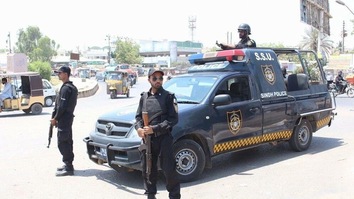PESHAWAR -- Terrorists are inflicting a grim economic toll on Pakistan, one that the State Bank of Pakistan (SBP) recently made specific.
Since 2002, extremist violence has cost the country US $118.3 billion (Rs. 12.4 trillion) in direct and indirect losses, the SBP said in its annual report for fiscal year 2015-2016.
The SBP released the report in November.
"Both economic growth and social sector development have been severely hampered by terrorism-related incidents," the report said.
Losses take all shapes: ranging from foreign investments never made to declining trade to outright capital flight, the study explained.
"The loss suffered by Pakistan due to war against terrorism is almost double the level of its external public debt," the report continued.
Horrific human toll
However, the cost to Pakistan amounts to more than rupees, Brig. (ret.) Mehmood Shah of Peshawar, a security analyst and former secretary of security for the Federally Administered Tribal Areas (FATA), told Pakistan Forward.
"Far more than the calculations of the [SBP]" loom the loss of about 60,000 lives in that time and the destruction of schools, roads and other public property, he said.
Nobody can put a figure on the grief of families of terrorism victims, the trauma of entire populations displaced from FATA, and the suffering of maimed bombing survivors who become dependent on their families, he said.
Pakistan and the world community need to see the immeasurable losses that the country has suffered while fighting extremism, he said. Others agree on the monumental scale of Pakistan's losses.
Terrorism's damage "to Pakistan in general and to KP [Khyber Pakhtunkhwa] and FATA in particular is enormous", Peshawar-based Akbar Khan, businessman and founding president of the Tribal Areas Chamber of Commerce and Industry, told Pakistan Forward.
To defeat the militants, the nation has to stand united behind its security forces, he said.
Stalled development
Pakistan would "be a prosperous country now" if not for the militancy, Sardar Hussain Babak, a member of the KP Provincial Assembly, told Pakistan Forward.
Babak's party, the Awami National Party, lost more than 800 members to terrorist attacks over the years. The worst-hit Pakistanis were the residents of FATA, KP and Balochistan, he said, urging people to rise up against the extremists.
Members of all segments of society suffered either economic or human losses in the worst years of terrorism, Haji Ghulam Ali of Peshawar, former president of the Federation of Pakistan Chambers of Commerce and Industry, told Pakistan Forward.
"The period of 2002 to 2016 ... will be remembered as a 'black era' in this country's history," Ali, also a former senator, added.
Optimism emerges
That said, reason for optimism is emerging, Ali said, citing the "remarkable results" of Operation Zarb-e-Azb.
The Pakistani army launched that offensive in North Waziristan in June 2014. Zarb-e-Azb, which continues to this day, has killed or driven out thousands of extremists.
The people should unite to defeat terrorists, who are a mere "handful" of individuals, and to usher in a new phase of development, Ali said.
Survivors of terrorism like Fawad Siddique of Peshawar refuse to give up.
A suicide bombing at the Meena Bazaar in 2009 destroyed his shop, he told Pakistan Forward.
"We had no option but to gather our energies and start from scratch," he said, adding that the majority of business owners in KP had similar stories of life with terrorism.
Fawad praised the resilience showed by Pakistan and expressed the hope that troops will soon defeat militants once and for all.

![Pakistanis gather at the Meena Bazaar in Peshawar on October 28, 2009, after a car bombing killed more than 90 persons, mostly women and children. Terrorism cost Pakistan about 60,000 lives and US $118 billion in losses from 2002 to 2016. [Courtesy of Adeel Saeed]](/cnmi_pf/images/2016/12/07/6722-loss1-585_329.jpg)






